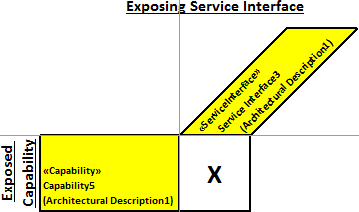SOV-3 Capability to service mapping (UPDM - MODAF aliases)

Creation
To create an SOV-3 Capability to Service Mapping:
• Right-click the
Architectural Description or
Service Description that is to own the SOV-3 Capability to Service Mapping, point to New, point to Matrix/Table, point to MODAF, and then click SOV-3 Capability to Service Mapping.
When you open an SOV-3 Capability to Service Mapping, Modeler can generate it as HTML for viewing in your Internet browser, or generate it as a spreadsheet for viewing in Microsoft Excel. To specify how matrices and tables are opened for a model: in the Packages pane, right-click the Model, point to > > , and then select HyperTextMarkupLanguage_HTML or Excel_XLS.
Each time you open an SOV-3 Capability to Service Mapping, Modeler generates the product using the latest data from the model.
Purpose
On an SOV-3 Capability to Service Mapping:
View which
Capability elements are exposed by
Service Interface elements.
Elements Shown
The SOV-3 Capability to Service Mapping shows the following elements:
• A row is created for each system
Capability that is found in the analyzed Packages, but only if the Capability is exposed by a Service Interface. An SOV-3 Capability to Service Mapping ignores Capability elements that are not exposed by a Service Interface.
In addition, a row is created for each Capability that is exposed by a Service Interface that is found in the analyzed Packages, even if that Capability is outside the scope of the analyzed Packages.
• A column is created for each
Service Interface that is found in the analyzed Packages, but only if the Service Interface exposes a Capability. An SOV-3 Capability to Service Mapping ignores Service Interface elements that do not expose a Capability.
In addition, a column is created for each Service Interface that exposes a Capability that is found in the analyzed Packages, even if that Service Interface is outside the scope of the analyzed Packages.
• An X in a cell shows that the associated Capability element is exposed by the associated Service Interface element.
Analyzed Packages
By default, the SOV-3 Capability to Service Mapping searches for Capability and Service Interface elements that are contained within the Architectural Description or Service Description that owns the SOV-3 Capability to Service Mapping.
To search for elements from other Architectural Description and Service Description packages: right-click the SOV-3 Capability to Service Mapping, point to Links, and then click Analyzed Packages. From the Links Editor, select the Architectural Description and Service Description packages from which you want to search for elements.
Customizing the Matrix
You can customize the presentation of an SOV-3 Capability to Service Mapping, for example, by changing the row and column labels that are used. For more information about customizing a custom table or matrix, see the following topics:
This matrix is an editable matrix. For more information on editable matrices, see
Editing Matrices.
Example
In this example, Architectural Description1 owns SOV-3 Capability to Service Mapping1 and the following elements:
• Two Capability elements: Capability1 and Capability2.
• Two Service Interface elements: Service Interface1 and Service Interface2.
On an SOV-3 Capability to Service Definition, we link Capability1 to Service Interface1 using an Expose relationship.

When generated, SOV-3 Capability to Service Mapping1 appears as follows.

From the generated matrix you can see the following:
• A row has been created for each Capability that is exposed by a Service Interface in Architectural Description1, that is, Capability1 but not Capability2.
• A column has been created for each Service Interface that exposes a Capability in Architectural Description1, that is, Service Interface1 but not Service Interface2.
• Service Interface1 exposes Capability1; shown by the X appearing in the their associated cell.
The following sections provide information about how an SOV-3 Capability to Service Mapping is used in the model.
Create an OV-3 Capability to Service Mapping from
Creates or shows these UPDM elements




